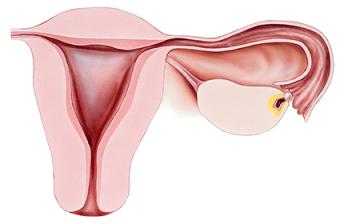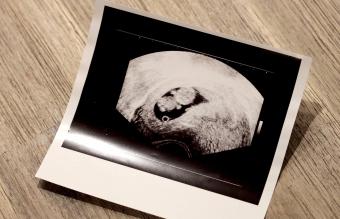
Even though you haven't actually conceived yet, your body is working hard to prepare itself for growing a healthy baby. There are many things you can do to improve your chances of conceiving and help give your baby a great head start.
Preparing for Conception
Although it can seem confusing, most medical practitioners begin counting the weeks of your pregnancy from the first day of your last period. In other words, you haven't conceived a baby yet. If all goes well, conception will occur around the end of week two or beginning of week three.
If you are already pregnant, jump ahead to Week Three to find out what's happening with your little one.
During the First Week of Your Cycle
According to US Department of Health and Human Services Office of Women's Health, there are some things you can do to get ready during this first week:
- Discontinue the use of birth control. Hormonal birth control, in particular, can interfere with your normal menstrual cycle.
- Take a daily over-the-counter prenatal vitamin that contains folic acid, which helps prevent neural tube defects in a developing fetus.
- Avoid the use of alcohol, recreational drugs, and tobacco products.
- Reduce stress in your daily life. Get a massage, take a walk, or do something else to help you relax this week.
- Exercise regularly and maintain a healthy diet.
- Discuss the use of prescribed and over-the-counter medications and their effects on a fetus with your physician.
- If you have a health condition, such as asthma, diabetes, or epilepsy, talk to your doctor to make sure your condition is under control.
- Reduce your exposure to toxic materials in your home and in your work environment.
During the Second Week of Your Cycle
You can also prepare for conception by identifying your "fertile window," or the six days when you're most likely to conceive. They may be during this week! According to a study published in the British Journal of Medicine, 30% of women experience their fertile window between days 10 and 17 of their menstrual cycles. In others, the window may be earlier or later. Because of this variability, it's important to track when you ovulate so you can time intercourse appropriately.
Here's how to know when you're ovulating:
- Take your basal body temperature (BBT) and record it daily. You can take your temperature orally, rectally, or vaginally each morning, prior to getting out of bed. Once you get up and move around, your body temperature is apt to rise. From the time your period begins until ovulation, your temperature will vary between 97.2 degrees F and 97.6 degrees F, but from the time of ovulation until your next period begins, your BBT will typically raise as much as one degree.
- Use a fertility monitor. An electronic fertility monitor can help you get pregnant, since it can alert you to a rise in the amount of estrogen in your urine. Depending on the monitor you purchased, it may also track your BBT.
- Purchase and use an ovulation predictor kit. This kit will test the luteinizing hormone (LH) level in your urine. Typically, you'll notice an increased LH level 24 to 36 hours prior to ovulation.
- Keep an eye on your cervical mucus. You may notice an increase and a change in the sticky clear or white discharge when you wipe. This increased mucus can be a sign of ovulation.
According to the Mayo Clinic, you can increase your chances of conceiving by having sex once each day during your fertile window.
Your Body

For the first few days of your first week, you'll be experiencing your normal menstrual cycle. Your uterus is shedding the unneeded lining that it has built up for the past month. Basically, your body is doing a little housekeeping to prepare for your little one. With any luck, you won't have your period again for nine months. Note the date your period starts, so you can have this information handy when you visit your doctor. He or she will use this date to calculate your baby's due date.
At some point the first week, your body will also begin producing a hormone that tells your ovaries that it's time to start preparing some eggs. Follicle stimulating hormone (FSH) alerts the follicles in your ovaries to begin releasing estrogen, helping the eggs to mature. Toward the end of the second week, the follicles will begin to move toward the outer surface of your ovaries, and one egg, the best of the bunch, will be released. The other eggs will simply disintegrate. When you ovulate, likely toward the end of the second week, the egg will be released into the fallopian tube to wait for your significant other's sperm.
Meanwhile, your uterus is getting ready to nourish a baby. The lining of your uterus, called the endometrium, is becoming thicker. Additionally, more blood is flowing to your uterus, and the angle of your cervix changes to make it easier for sperm to enter and fertilize your egg.
More to Know About Preparing for Your Pregnancy

Being aware of the changes happening in your body is an important part of getting ready to conceive. There are a few other things you should consider as well.
If you need help downloading the printable calendar, check out these helpful tips.
Talking to Your Doctor
Before getting pregnant, many women choose to visit their doctor for a check-up. Although it isn't necessary, it's a good idea to check in and make sure your body is ready for the big job ahead. Your doctor can help with the following:
- Recommendations on folic acid supplements and other prenatal vitamins
- Tests and screenings that can assess your health and alert your doctor to any infections you might have
- Answering questions and concerns you may have
- Ideas for improving your health and increasing the likelihood of conception
- Making sure your immunizations are up to date
- Minimizing the risk of health problems that run in your family
- Possible effects of any of your medications and supplements
Other Practical Considerations
Keep these tips in mind as well:
- Take this opportunity to purchase home pregnancy tests. You can purchase single test kits or, for just a few dollars more, pick up double kits. That way, you'll be ready to check at the earliest possible chance.
- Review your medical insurance. Know what your coinsurance and deductible will be for prenatal visits and delivery. Often the doctor's fee for both are calculated upfront and paid over the course of your pregnancy. This information will help you budget for your pregnancy and delivery.
- If your employer offers flex spending benefits, look into increasing your contributions to this account. Pregnancy tests, prenatal vitamins, and other pregnancy related expenses may be covered under the plan, which means you can lower your tax bill by having your expected medical expenses taken out of your paycheck before tax.
Looking Forward
Although you aren't yet pregnant and your baby is little more than a glimmer your eye, but it is never too early to give you and your baby the best chance at a healthy pregnancy. Understanding how your body is changing and preparing can help improve your chances of conception. This is a period of great expectation as your body gets ready to nurture a baby for the next nine months. Your body has a lot of work ahead of it, so do everything you can to help it out.







